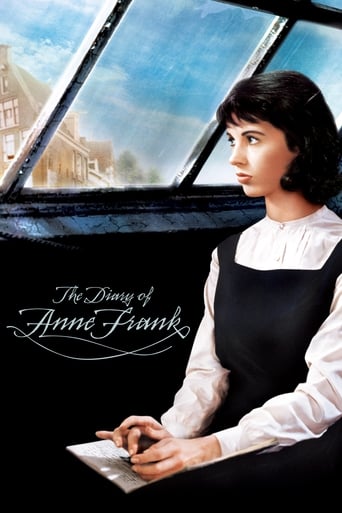Un Film de George Stevens
"The Diary of Anne Frank," released in 1959 and produced by George Stevens Jr. Productions in collaboration with 20th Century Fox, is a poignant cinematic adaptation of the real-life experiences of a young Jewish girl during World War II. Directed by George Stevens, the film captures the harrowing yet hopeful narrative of Anne Frank, who, along with her family, hid from Nazi persecution in a secret annex in Amsterdam. The film's strength lies in its faithful adaptation of Anne's diary, which provides an intimate and personal perspective on the horrors of the Holocaust, seen through the eyes of a teenager grappling with the complexities of adolescence amidst the backdrop of war. Millie Perkins delivers a compelling performance as Anne Frank, embodying the character's youthful optimism and resilience. The ensemble cast, including Joseph Schildkraut, Shelley Winters, and Richard Beymer, effectively portrays the tension and claustrophobia of life in hiding, as well as the fragile bonds that form among the inhabitants of the annex. The film's meticulous attention to detail in recreating the annex and the period's atmosphere adds a layer of authenticity that enhances the emotional impact of the story. Cinematographer William C. Mellor's black-and-white photography further intensifies the somber mood, drawing viewers into the confined world of the characters. George Stevens' direction is both sensitive and powerful, balancing the diary's lighter moments with the ever-present threat of discovery and deportation. The film does not shy away from depicting the harsh realities faced by Jews during the Holocaust, yet it also highlights moments of humanity and hope, reflecting Anne's belief in the goodness of people. The screenplay, adapted by Frances Goodrich and Albert Hackett, remains true to the spirit of Anne's writings, preserving her voice and the diary's universal message of hope and resilience in the face of adversity. "The Diary of Anne Frank" stands as a testament to the enduring power of Anne's words and the importance of remembering the atrocities of the Holocaust. The film's impact extends beyond its historical context, serving as a reminder of the resilience of the human spirit and the need to combat intolerance and hatred. Through its compelling narrative and strong performances, the film continues to resonate with audiences, ensuring that Anne Frank's story and the lessons it imparts remain relevant and poignant for future generations.
Año1959
Presupuesto3000000$
Duración180 minuto
GénerosDramaHistoria
Países de producciónUnited States of America

